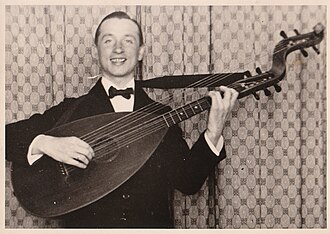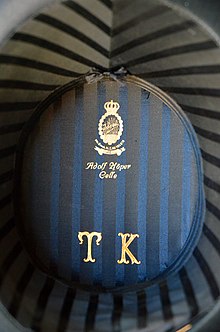Theodor Krüger (musician)

Theodor Krüger (born January 13, 1891 in Celle , Hanover province ; † December 28, 1966 ibid) was a German music teacher , choir director , pianist , composer and author, particularly on historical flutes .
Life

watercolor photography in Art Nouveau style

Theodor Krüger grew up in Celle. Born at the time of the German Empire , Theodor Krüger received his first music lessons at the age of 9 from the pianist and flautist Friedrich Ferdinand Theodor Bach , who served as a musician in the military band of the Celle Infantry Regiment No. 77 . While still training as a pianist at the Louis Krohn Music School in Braunschweig , he was already writing his first compositions. In 1910 he returned to Celle, where he undertook further studies in piano and theory with Fritz Reichert and Heinrich Lutter , with whom he then founded the Verein der Musikfreunde Celle . He acquired his qualification as a choir director by studying singing with the concert and oratorio singer Heinrich Kühlborn .
Also in 1910, during the shooting festival in Celle, Krüger met his future wife Marie Suerburg (born May 18, 1891 in Celle; † February 2, 1983 in Metzingen ); the two married on August 14, 1914. The couple had two sons: Walter (born August 21, 1911 in Celle, died October 2, 1941 in Russia ) and Hans (born April 4, 1927 in Celle, † July 15, 1986 in Metzingen).
During the First World War he served as a soldier , presumably in a chapel, with an unknown location.
In 1923 he founded the men's double quartet “The Eight”. For a time Krüger took over the leadership of the larger male choirs in Celle: Thalia , Euterpe and, at the time of National Socialism, also the male choir Cellensia , which was a member of the German Choir Association . Theodor Krüger was also active in other musical areas: he took over the management of the 1st Celle Handharmonica Club from 1936 on February 1, 1937.
In his house at Am Heiligen Kreuz 27 in the old town of Celle , he taught piano, recorder and theory to music students . Among his students was Hermann Alexander Moeck .
Theodor Krüger researched and taught historical musical instruments , especially woodwind and string instruments .
After the Second World War , Krüger led, among other things, the mixed choir Wathlingen and the folk choir Burgdorf .
He died shortly before his 76th birthday. His grave can be found in the Celle city cemetery .
Works
Compositions
- Caress (Cajolerie) - waltz for piano ( dedicated to Fräulein Marie Surburg in admiration ) , Hanover: Verlag Gries & Schornagel, issue 272
- German Faith , song for voice and piano, 1934; Saxonia record as Pliaphon - self- cut foil ( unique "only for personal use"), Dresden: Musikverlag Saxonia, Landhausstrasse 11, with letter from June 9, 1934, with stamp Deutsche Musik-Premieren-Bühne eV, record recording department
- Celle-Lied (piano setting; text and manner by Arnold Breling)
- Gondolièra aràbique - Exotic Poèm for piano
Fonts
- Various writings in "Der Blockflötenspiegel" - worksheets for the animation of historical instruments in youth and domestic music , Verlag Hermann Moeck, Celle:
- New demands for the reproduction of early music , born 1931, issue 5, May, pp. 33–39
- An old master ( JH Schein ) introduces himself , born in 1931, issue 7, July, pp. 72–75
- Invitation to a working meeting for players of recorders and other historical instruments at the Ludwigstein Youth Castle from 17.-21. May 1932 , year 1932, issue 5, Addendum
- The new requirement: Facsimile prints by old masters for practical use , year 1932, issue 2, February, pp. 17-23
- The notation of the clay color , year 1933, issue 11, pp. 21-22
estate
From the estate of the composer and amateur photographer Theodor Kruger among others, for example, several boxes were glass plates - negative to the Bomann Museum passed in Celle.
literature
- NN : The Choirs of the Krüger Circle , in: Cellesche Zeitung of October 15, 1928
- NN: Forty years of choir work , in: Cellesche Zeitung of March 31, 1950
- Harald Müller (text), Ulrich Loeper (pictures): Biographical-bibliographical lexicon of Celler musicians. Composers, singers, instrumental musicians, music educators, musicologists, instrument makers, bell founders, music publishers, music dealers and music therapists (= Celle contributions to regional and cultural history. Series of publications by the City Archives and the Bomann Museum Celle , vol. 31), ed. von der Stadt Celle, Celle: Stadt Celle, 2003, ISBN 3-925902-50-3 .
Web links
swell
- Family obituaries in the Cellesche Zeitung (CZ)
- Program sheet "The Eight" from October 13, 1935
- Program sheet for the men's choir "Cellensia" from January 16, 1937
- Program sheet I. Celler Handharmonika-Klub from April 25, 1937
- “Der Gong” - self-published for the silver wedding anniversary August 14, 1939
References and comments
- ↑ a b c d e Harald Müller (text), Ulrich Loeper (pictures): Biographical-bibliographical lexicon of Celle musicians. Composers, singers, instrumental musicians, music educators, musicologists, instrument makers
- ↑ Compare the obituary in the Cellesche Zeitung of December 29, 1966
- ↑ Note: Deviating from this, the biographical-bibliographical lexicon of Celler Musicians ... names the date of death January 2, 1967 , which however was the date of burial. Compare the obituary in the Celleschen Zeitung of December 29, 1966
- ↑ Note: In his dissertation , Moeck thanked his music teacher Theodor Krüger, among others, for his support with the difficult acquisition of literature and image material; compare Hermann Alexander Moeck: Origin and tradition of the core slit flute of the European folk race and the origin of the music-historical core slit flute types ( typescript ), dissertation from January 6, 1953, Philosophical Faculty of the Georg-August-Universität Göttingen , Celle: Hermann Alexander Moeck, 1953
| personal data | |
|---|---|
| SURNAME | Kruger, Theodor |
| BRIEF DESCRIPTION | German Kapellmeister, pianist and music teacher as well as composer |
| DATE OF BIRTH | January 13, 1891 |
| PLACE OF BIRTH | Celle |
| DATE OF DEATH | December 28, 1966 |
| Place of death | Celle |
